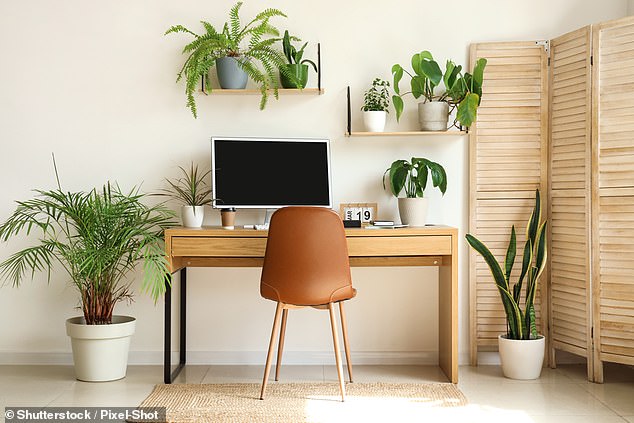Houseplant collectors will know the changing seasons bring new challenges for their care.
And the Royal Horticultural Society sounded the alarm for winter yesterday – warning there are ‘six weeks to save our house plants’.
Plant owners should check in on the health of their houseplants this week as it prepares for a sharp increase in reported problems in the new year, the charity said.
A combination of lower light levels, fluctuating temperatures from central heating and reduced humidity can stress plants, resulting in yellowing of leaves, bud drop, scorching and shrunken compost, and, potentially, the eventual loss of the plant.
Identifying issues now and making small changes to houseplants’ positioning and care can ensure plants make it through to spring with the RHS listing some of the early warning signs to look out for and potential fixes.
January is when people call the RHS advice line on how to save plants that have shrivelled up or wilted.

Houseplant collectors will know the changing seasons bring new challenges for their care. And the Royal Horticultural Society sounded the alarm for winter yesterday – warning there are ‘six weeks to save our house plants’ (stock image)

Plant owners should check in on the health of their houseplants this week as it prepares for a sharp increase in reported problems in the new year, the charity said
The month sees 85 per cent more inquiries in January than in December and November, according to the RHS.
Pot plants boomed during the pandemic as people spent more time at home – and the fad for posing with Swiss cheese plants and aspidistra on social media appears to be continuing.
RHS Plants also sees one of three peaks in plant purchases at the start of the year when people have potentially resolved to start afresh.
Another is in the run up to Christmas when the gifting of plants is popular, with favourites including poinsettia, azaleas, Christmas cacti and cyclamen.
To ensure these get off to the best start, the RHS advice team recommends buying fresh stock with no sign of browning leaves, and taking them straight home to a cool room – such as a bathroom – to acclimatise before moving them into warmer areas of the house.
Chris Taylor, RHS Horticultural Advisor said: ‘When it comes to houseplants be guided by the weight of the pot when watering and use your finger to gauge how moist the potting compost feels.
‘The aim is to keep plants moist but never soggy. If plants do become soggy they can sometimes be saved by tipping out of the pot and drying the roots with some kitchen towel before repotting.’
If despite best efforts houseplants are looking unwell, there are several good replacements for the winter months .

A combination of lower light levels, fluctuating temperatures from central heating and reduced humidity can stress plants, resulting in yellowing of leaves, bud drop, scorching and shrunken compost, and, potentially, the eventual loss of the plant (stock image)
They include moth orchids, which are happy in warmer rooms, ZZ plant (Zamioculcas zamiifolia) and spider plant (Chlorophytum comosum) both of which are resistant to forgetful watering and low light levels.
Rabbit’s foot fern (Davallia solida var. fejeensis) is another option as, unlike most ferns, it can tolerate some dryness and is easy to water the spreading surface rhizomes that soak up water when misted.
Guy Barter, Chief Horticulturist, said: ‘Houseplants are increasingly popular, particularly with people starting out on their gardening journey or for whom outside space is at a premium.
In May, houseplant advice sought by members centres around what to grow and where, in August, when temperatures peak, it turns to care and maintenance, while in January it tends to be how to remedy plants that have wilted, turned brown or are otherwise looking suspect.
‘In fact, we receive 85 per cent more enquiries in January than the preceding two months.
‘Often, we diagnose that these plants have been inadvertently neglected in November and December when central heating leads to fluctuating temperatures and lower levels of humidity which stress plants and they crave a move to a light-filled spot to while away the darker days.
In many cases, houseplants can be rescued with a bit of TLC but January also sees a spike in houseplant sales at RHS Plants when people have potentially resolved to start afresh.’
This article was originally published by a www.dailymail.co.uk . Read the Original article here. .


